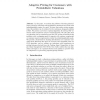Free Online Productivity Tools
i2Speak
i2Symbol
i2OCR
iTex2Img
iWeb2Print
iWeb2Shot
i2Type
iPdf2Split
iPdf2Merge
i2Bopomofo
i2Arabic
i2Style
i2Image
i2PDF
iLatex2Rtf
Sci2ools
ATAL
2006
Springer
2006
Springer
Adaptive Pricing for Customers with Probabilistic Valuations
Abstract. In this paper, we examine the problem of choosing discriminatory prices for customers with probabilistic valuations and a seller with indistinguishable copies of a good. We show that under certain assumptions this problem can be reduced to the continuous knapsack problem (CKP). We present a new fast -optimal algorithm for solving CKP instances with asymmetric concave reward functions. We also show that our algorithm can be extended beyond the CKP setting to handle pricing problems with overlapping goods (e.g.goods with common components or common resource requirements), rather than indistinguishable goods. We provide a framework for learning distributions over customer valuations from historical data that are accurate and compatible with our CKP algorithm, and we validate our techniques with experiments on pricing instances derived from the Trading Agent Competition in Supply Chain Management (TAC SCM). Our results confirm that our algorithm converges to an -optimal solution ...
Algorithm | ATAL 2006 | Continuous Knapsack Problem | Fast -optimal Algorithm | Intelligent Agents |
| Added | 20 Aug 2010 |
| Updated | 20 Aug 2010 |
| Type | Conference |
| Year | 2006 |
| Where | ATAL |
| Authors | Michael Benisch, James Andrews, Norman M. Sadeh |
Comments (0)

